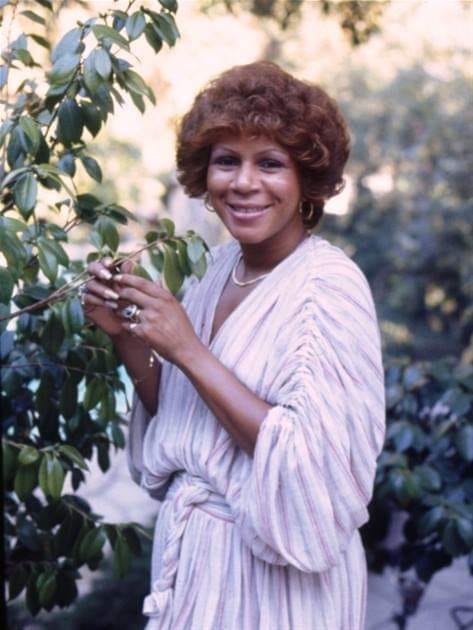Minnie Julia Riperton-Rudolph (November 8, 1947 – July 12, 1979), known professionally as Minnie Riperton, was an American singer-songwriter best known for her 1975 single “Lovin’ You” and her five-octave vocal range. Born in 1947, Riperton grew up in Chicago’s Bronzeville neighborhood on the South Side. As a child, she studied music, drama, and dance at Chicago’s Lincoln Center. In her teen years, she sang lead vocals for the Chicago-based girl group, The Gems. Her early affiliation with the legendary Chicago-based Chess Records afforded her the opportunity to sing backup for various established artists such as Etta James, Fontella Bass, Ramsey Lewis, Bo Diddley, Chuck Berry, and Muddy Waters. While at Chess, Riperton also sang lead for the experimental rock/soul group Rotary Connection, from 1967 to 1971.
On April 5, 1975, Riperton reached the apex of her career with her no. 1 single, “Lovin’ You”. The single was the last release from her 1974 gold album entitled Perfect Angel. In January 1976, Riperton was diagnosed with breast cancer and underwent a radical mastectomy. By the time of diagnosis, the cancer had metastasized and she was given about six months to live. Despite the grim prognosis, she continued recording and touring. She was one of the first celebrities to go public with her breast cancer diagnosis, but did not disclose she was terminally ill. In 1977, she became a spokesperson for the American Cancer Society. In 1978, she received the American Cancer Society’s Courage Award which was presented to her at the White House by President Jimmy Carter.
She was the daughter of Daniel and Thelma Riperton, the youngest of eight children. At the age of three she started modern dance lessons, followed by ballet lessons at 5. Her voice lessons began at the age of nine and she was developing her operatic chops at 11.
Her goal at a very young age was to become a famous singer. Riperton studied opera under Marion Jeffries. She spent months and months learning how to breathe and listening to and holding vowels. Eventually, she began singing operas and operettas along with a show tune every so often. As a as a freshman she sung in the a cappella choir of Hyde Park High School.
She left school early to make $10 a song, singing backup at local studios. Some reports indicate that Minnie signed her first contract at 14, while others report her to be 16. Despite her natural talent (a pure five to six octave soprano) for opera, Riperton was more attracted to “Rock N Roll” and the promise of touring. She would inevitably discontinue her classical training to follow her dream of being a famous vocalist. It would, however, be her classical training, which brought her the success she sought. Riperton signed a recording contract with the “Gems” at Chess Studios, and in 1967 she joined the “rock/jazz/vocal ensemble” Rotary Connection.
The style of the Rotary Connection was very progressiv– somewhere between rock, jazz, pop, and experimental. Riperton was with the Rotary Connection when she met the love of her life, her husband, Richard Rudolph. They had two children, Maya and Marc, whose names are included the names of two of her songs. Maya is the name of the girl in the tale of “Love And Its Glory,” and a personal reference to both can be found towards the end of “Lovin’ You.” She sings to Marc in “Wouldn’t Matter Where You Are.” Riperton did backup vocal work with Quincy Jones, Roberta Flack, Freddie Hubbard, and Etta James.
In 1969, she recorded the album “Come To My Garden” which was released in 1971, then came “Perfect Angel” and “Adventures in Paradise” in 1974 and 1975. The following year Riperton announced that she had been diagnosed with breast cancer and had undergone a modified mastectomy. Her “experience” (as she referred to her illness) would give her yet another reason for her life … lending her celebrity and compassion for others to become a spokesperson for breast cancer awareness, the need for self-examination, and the benefit of early detection.
Within weeks after her surgery, she appeared for the taping of the Ebony Music Awards. When she received her “Ebby,” she later revealed, she was overcome by the knowledge of how lucky she was to have made it through the ordeal she and her family had gone through.
Riperton continued on a crusade to get the word out to as many women as possible. Since tennis was her game, you would find her at almost all the celebrity tournaments for charity. In 1977, the) President Jimmy Carter presented her with the American Cancer Society’s “Courage Award.” A year later, Riperton would become that organization’s National Education chairwoman.
In addition to being a mother, wife, activist, fund raiser, lecturer, wife, and mother, she signed with Capitol Records, a contract that gave her the creative freedom and production quality that she desired. During the summer of 1978, creating what would be her last album, simply entitled “Minnie.” She passed away in her husband’s arms on July 12, 1979, at 31 years of age.

